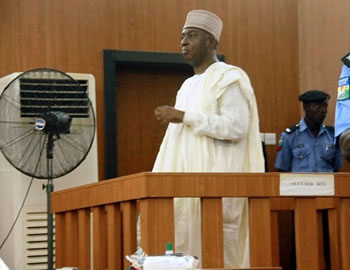Following the recent decision of the Code of Conduct Tribunal (CCT) to reserve judgment on the no-case submission of the counsels for the Senate President, Dr Bukola Saraki, who is being prosecuted before the tribunal, MOSES ALAO takes a look at some of the issues ahead of the judgment.
NEARLY two years after the prosecution of the Senate President and former Kwara State governor, Dr Bukola Saraki, began at the Code of Conduct Tribunal for alleged breach in the declaration of his assets before and after his two terms as governor, the highly dramatic episodes, which the trial had continued to turn out in the last 23 months might come to the end or begin a fresh series, with the Code of Conduct Tribunal’s recent decision to reserve its ruling on the no-case submission filed by the defence team.
The CCT chairman, Mr Danladi Umar, had, on Thursday, reserved its ruling on the position of Saraki’s lawyers that the Federal Government had failed to prove its case against the senate president, in spite of the government’s insistence that the senator had a case to answer.
Saraki, who is being prosecuted by the Federal Government on a 16-count charge bordering on false declaration of assets and other breaches, however, believes that the case against him had not been proven succinctly by the prosecution, thereby demanding that the CCT throws it out of the window.
The trial, which began in September 2015 with a 13-count charge, had accused the former governor of anticipatory asset declaration, acquisition of property beyond the means and income of a governor and refusal to declare some assets, among others, had taken different turns, with the Federal Government at some points, adding and deleting charges against the former governor, while the latter continued to insist on his innocence, declaring the trial as a witch-hunt.
Proceeding after proceeding, the prosecution tried to establish the charges against Saraki while the defence counsel held to their ground that the latter had no case and that it had, against the spirit and letters of the law that he who asserts a case must prove, failed to justify the claims brought against the senate president.
With the interest of the public sustained in the drama that followed each of proceeding, Saraki’s CCT trial soon became a topic of national discourse, with most Nigerians being divided along two lines of pro-Saraki and pro-FG, as each side sought to establish the rightness or wrongness of the other in the prosecution.
While that interest seems to have waned, however, the likely end or fresh beginning of the legal drama between the Federal Government and the number three man in the country, will, in a short while, provide fresh dimension to the political intrigues in the corridor of power.
As the Tribunal mulls over whether to sustain the position of the defence team led by Chief Kanu Agabi, SAN, that the Federal Government had no case against Saraki, thereby striking out the case despite the Federal Government’s insistence that he had case to answer or to sustain the position of the government and thereby compel Saraki’s team to open its defence, the issue of whether justice would be served and be seen to have been served remained the number one issue.
With the senate president standing by his claim that the prosecution was a political persecution and an attempt to shame him for daring to go against some people to contest and become the senate president and the Federal Government’s statement to the contrary, the public interest remains that the Tribunal gives a ruling in the context of what will best serve the interests of justice and the nation? Are the charges against Saraki true? Have they been proved beyond reasonable doubt in these last 23 months? These are the questions that have agitated the minds of the interested public but then, for political observers sympathetic to Saraki, there is also a question of whether any Nigerian should be persecuted for following the constitution in seeking an office through legal and legitimate means. These and many more questions are before Justice Umar and his colleague, Mr Peter Atedze, ahead of a final judgment on the no-case submission stance by Saraki.
The task before the Tribunal becomes more important in the face of the divided opinions about the case and the way it has been handled by the prosecution in the last few months, with many people observing that the Economic and Financial Crimes Commission (EFCC) and the Code of Conduct Bureau, the two agencies of government behind the case at the CCT, appeared to not have carried out detailed and effective investigations on the charges before rushing to the Tribunal, leading to several dramatic turns in the case. The onus is, therefore, on the Tribunal to, among other things, decide the case in a way that the time and resources of the country will be wasted on a full-scale prosecution of a case that is not well-investigated and which outcome might already be known to legal minds and, indeed, those who had been following the case and the many volte-face of some of the prosecution witnesses.
Commenting on the case, a top shot in the ruling party, who does not want his name in print, described the CCT trial as a needless trial allowed to go too far, pointing out that the onus now “lies on the Tribunal to make a good show of itself by demonstrating its commitment to justice. The two judges must be bold and ready to ignore the distractions and put an end to this matter.”
According to him, though it might not be easy for the Tribunal to decide to end the case, which has become clear, lacked substance and had not even been justified by those who filed it, because the members of the Tribunal might be blackmailed, the two justices must put their feet down on the matter if they are convinced like many Nigerians now, that the case was a plain matter of political persecution.
“We are all living witnesses to how some people now raise untrue allegations against judges on the eve of delivering judgements; it happened when the case filed against the entire proceeding at the Tribuna came up at the Federal High Court and the Court of Appeal last year. There were instances where judges presiding over cases had to recuse themselves. I have no doubt that those interested in shaming Saraki will come up with different tricks using their cronies in the online media, but the Tribunal members must be ready to deliver justice, no matter whose ox is gored or whosoever interest it may serve,” the APC chieftain noted.
As Nigerians await the judgment on the no-case submission, therefore, the pertinent questions have been whose interest would be hurt and whose interest would prevail in what has become a highly-charged political war of attrition. The only interest that matters and must not be hurt is that of justice and diligent prosecution. But with the common factor in law that the prosecution must prove its case beyond reasonable doubt, the question Nigerians are wont to ask is whether the prosecution had been able to prove the charges against the senate president.
From what Nigerians could glean from the proceedings so far, the prosecution headed by Mr. Rotimi Jacobs, SAN, seems to have left many people in doubt as to its preparedness for the legal tussle with Saraki, with its biggest witness being Mr. Michael Wetkas, whose appearance in the witness box, left more doubts in the minds than convictions as to whether the prosecution, indeed, did its homework before heading to the Tribunal. Subsequent witnesses had turned out to be in rigmarole, falling short of the weak testimony filled with irregularities, which was the best Wetkas could come up with.
With Saraki’s lawyer insisting that the prosecution had not been able to prove its case against the senator, pointing out that the prosecution had not even been able to bring out a case that warranted Saraki’s answer and the Federal Government’s stance that he must answer to the case, the bulk has now been shifted to the desk of the CCT, which reserves the right to end the drama or allow the show to go on, though from the little shown already, one of the leading actors appeared to be missing his lines, missing the cues and messing up the play. More importantly, it is becoming clear from recent developments in the judicial system that government cannot wish people to guilt by merely hating their faces, it must carry out thorough investigations and diligent prosecution; this is another case that the Tribunal will need to make when it decides to either strike out the case against strike or let it run its full course. Whichever way, it cannot be the end of the show for Saraki and for the interests after him; in fact, political watchers fear that if the Tribunal decides to strike out his no-case submission and the defence lawyers open their defence, it might prove to be the beginning of another wasteful trial whose end is already known.
WATCH TOP VIDEOS FROM NIGERIAN TRIBUNE TV
- Let’s Talk About SELF-AWARENESS
- Is Your Confidence Mistaken for Pride? Let’s talk about it
- Is Etiquette About Perfection…Or Just Not Being Rude?
- Top Psychologist Reveal 3 Signs You’re Struggling With Imposter Syndrome
- Do You Pick Up Work-Related Calls at Midnight or Never? Let’s Talk About Boundaries






